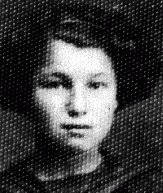
Sarah Rivka Felman
Born: 1923
Sokolow Podlaski, Poland
One of seven children, Sarah was raised in a Yiddish-speaking, religious Jewish home in Sokolow Podlaski, a manufacturing town in central Poland with a large Jewish population of some 5,000. Sarah's parents ran a grain business. In 1930, Sarah began attending public elementary school in Sokolow Podlaski.
1933-39: After graduating from middle school in 1937 at the age of 14, Sarah helped out her now widowed mother in the family's grain business. Two years later, Germany attacked Poland. German aircraft bombed Sokolow Podlaski's market and other civilian targets. German troops entered the town on September 20 and burned the main synagogue three days later. The Germans then confiscated the family's grain business.
1940-42: Over the next two years, the Germans imposed restrictions on the Jews, eventually ordering them to wear an identifying Jewish star on their clothing. On September 28, 1941, the Germans set up a ghetto and concentrated the town's Jews there. About a year later, on the most solemn holiday in the Jewish religion, the Day of Atonement, the Germans began to round up the people in the ghetto. Those who resisted or tried to hide were shot. Sarah, her mother and younger brother were herded onto the boxcar of a train.
On September 22, 1942, Sarah and her family were deported to the Treblinka killing center. She was gassed there shortly after arriving. She was 19 years old.